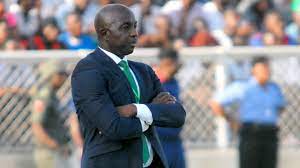According to CAS, a life ban for a first time offender was inappropriate
A former Super Eagles player and coach, Samson Siasia, who was handed a life ban by the world football governing body FIFA over match-fixing allegations has had his punishment reduced to a five-year ban by the Court of Arbitration for Sports (CAS).
The reduction of Siasia’s punishment was communicated via an official statement by CAS on Monday.
According to CAS, a life ban for a first time offender who was also passive in the said offence was inappropriate though such acts need to be punished all the same to serve as a deterrent to others.
Offence
As revealed by CAS, in 2010, a match-fixer tried to involve Siasia as a coach of a club under his strict instructions. With the promise of employment benefits, Siasia would have had to always field several players under the control of the match-fixer. The negotiations between the match-fixer and Siasia in relation to the conditions of employment were conducted by email over a period of two months.
Eventually, the club did not accept or could not afford Mr Siasia’s requests and the negotiations ended.
New punishment
On this premise, the CAS Panel confirmed the Challenged Decision and reduced the punishment for the ex-Super Eagles star. “Mr Siasia is banned for 5 (five) years from taking part in any kind of football-related activity at national and international level (administrative, sports or any other) as of 16 August 2019,” CAS said in its Monday statement.
It added: “The imposed fine of CHF 50,000 (fifty thousand Swiss Francs) on Mr Siasia is set aside.
“The Panel determined the imposition of a life ban to be disproportionate for a first offence which was committed passively and which had not had an adverse or immediate effect on football stakeholders, and that a five-year ban would still achieve the envisaged aim of punishing the infringement committed by Mr Siasia.”
The panel acknowledged the need for sanctions to be sufficiently high enough to eradicate bribery and especially match-fixing in football.
However, the panel considered in the particular circumstances of this matter that it would be inappropriate and excessive to impose a financial sanction in addition to the five-year ban, since the ban sanction already incorporated a financial punishment in eliminating football as a source of revenue for Siasia, and considering that Siasia had not obtained any gain or pecuniary benefit from his unethical behaviour.



CAF Confederation Cup
Simba book final spot in CAF Confederation cup

CAF Confederation Cup
Simba book final spot in CAF Confederation cup
Must See
-


AFRICA
/ 5 years agoSierra Leone FA President Isha Johansen endorses Patrice Motsepe for CAF President
Sierra Leone FA President who also doubles up as CAF Executive Council member Madam...
-


Football
/ 5 years agoIT JUST CAN NOT BE – AN AFRICA FULL OF MORONS?
By John De Mathews, There is an eerie silence around Africa, and it is...


















